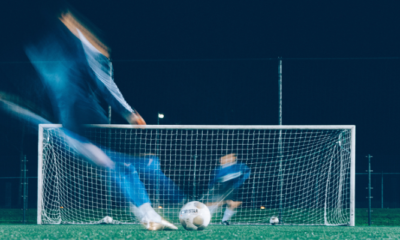Innovation
The future of VAR: Potential Improvements To The System And Its Role In Shaping The Future Of Soccer (Football).

Soccer (Football) has always been a sport that inspires passion, excitement, and great debates. Whether it’s about the latest transfers, the tactics of your favorite team or the performance of referees during games, there is always something to talk about. And in recent years, one topic that has generated plenty of discussion among Soccer (Football) fans and experts alike is VAR. The video assistant referee system was introduced to reduce errors on crucial decisions made by referees during matches. However, its implementation hasn’t been without controversy and criticism. In this blog post, we’ll explore how VAR can be improved to shape the future of Soccer (Football) for the better!
The potential improvements to the system.
Following its introduction in professional Soccer (Football), the Video Assistant Referee (VAR) system has been subject to criticism and scrutiny. There have been concerns about inconsistencies in decision-making and delays during matches.
To address these issues, there are several potential improvements that could be made to the VAR system. Reducing the time taken for reviews would help maintain the flow of games. One solution might be to limit each review to a set amount of time or allow referees to view plays at full speed before reviewing them more closely.
Increasing transparency around decisions made with VAR could improve trust in the system. This could involve providing more information on why certain decisions were made or allowing fans access to video replays shown on stadium screens.
Implementing technology such as automated offside detection could reduce errors caused by human error and make decisions quicker and less controversial.
While VAR has brought significant benefits to professional Soccer (Football), there is still room for improvement. By addressing some of these key issues through changes to the system’s operation and technology implementation, we can ensure it continues playing a positive role in shaping our beautiful game for years to come.
VAR’s role in shaping the future of Soccer (Football)
VAR, or Video Assistant Referee, has already made a significant impact on the game of Soccer (Football). However, its role in shaping the future of Soccer (Football) is even more profound. VAR technology provides an opportunity for officials to make decisions with greater accuracy and reduce human error.
The use of VAR will enhance player accountability and discipline during matches. Players will be less likely to commit fouls knowing that there is a high chance they will get caught by the system, thus making the game fairer for all players involved.
Moreover, it could redefine how coaches approach their strategies during games as well as training sessions. With detailed video analysis at hand and instant replay capabilities offered by VAR systems, teams can analyze every aspect of their performance to improve on areas needing attention.
Additionally, VAR’s introduction changes how fans watch and experience live matches altogether. Supporters can no longer rely solely on subjective opinions from commentators or biased views from pundits; instead they have access to objective evidence-based information when evaluating key moments in matches.
What lies ahead for VAR is exciting – its potential improvements are immense – not just within decision-making processes but also enhancing player conduct along with coaching techniques while changing how fans engage with this beautiful game we call Soccer (Football).
The benefits of VAR
VAR has been a topic of heated debate since its introduction in Soccer (Football). However, there are several benefits to the system that cannot be ignored. One of the most significant advantages of VAR is that it helps officials make more accurate decisions.
With slow-motion replays and multiple angles, VAR provides referees with a better view of incidents on the pitch. This means that they can make informed decisions based on what they have seen rather than relying on guesswork or hearsay from other players.
Another benefit of VAR is that it ensures fairness in the game. Referees are human and prone to making mistakes, but VAR reduces these errors significantly by providing an extra layer of scrutiny for every decision made during a match.
Furthermore, VAR promotes transparency in Soccer (Football) by allowing fans to see how certain decisions were reached. Instead of having to rely solely on the referee’s word, supporters can now witness incidents from different angles and form their own opinions about what happened.
One underrated benefit of VAR is that it adds excitement to games. Fans love seeing close calls reviewed and debated over before being finally decided upon using technology – it adds another dimension to watching matches.
The disadvantages of VAR
Despite all its advantages, the use of VAR in Soccer (Football) has also come with several disadvantages that cannot be overlooked. The time taken to review decisions can disrupt the flow and rhythm of a match. This means that players may lose their concentration and momentum, leading to a less exciting game.
Additionally, there is still some subjective interpretation involved in VAR decision-making even after reviewing replays multiple times. The referees’ subjectivity may lead to controversial decisions which could negatively impact teams and cause frustration among fans.
Furthermore, not all leagues or countries have access to this technology due to financial constraints. This puts certain teams at an unfair advantage compared to others who are able to utilize it.
Since only certain incidents are reviewed by VAR such as goals scored or penalty calls made by referees on-field, there is still room for errors in other areas of play such as foul play or offside situations.
Therefore while VAR has clear benefits in improving accuracy of decisions made during games, these disadvantages must also be acknowledged and addressed moving forward.
Conclusion
From what we have seen, VAR has brought a lot of changes to the game of Soccer (Football). It has its benefits and disadvantages, but there is no doubt that it has improved the accuracy of decision-making in Soccer (Football). The potential for improvement in the system is quite big, with suggestions such as using technology to make decisions faster and improving communication between referees.
VAR’s role in shaping the future of Soccer (Football) cannot be underestimated. With more accurate decisions being made on the pitch, players will feel more confident that they are being treated fairly. This should lead to less frustration and fewer arguments amongst players and officials.
While there may still be some teething problems with VAR at present, it is clear that this technology has already had a significant impact on Soccer (Football) – one that will likely only increase over time. The potential improvements to the system will only serve to enhance its effectiveness further. As fans continue to debate whether or not VAR belongs in Soccer (Football), it seems clear that this controversial system is here to stay – at least for now!


























